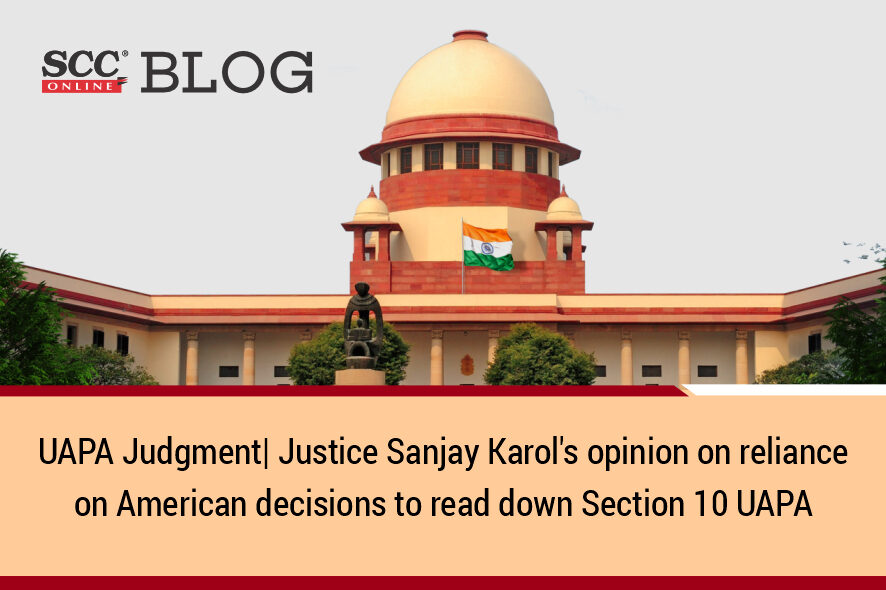Supreme Court: In a reference made on behalf of the Union of India and the State of Assam to larger bench, against the judgment and order passed in Arup Bhuyan v. Union of India, (2011) 3 SCC 377 as well as State of Kerala v. Raneef, (2011) 1 SCC 784, pursuant to the order passed by this Court in Arup Bhuyan v. State of Assam, (2015) 12 SCC 702, the full bench comprising of M. R. Shah*, C.T Ravikumar and Sanjay Karol*, JJ. upheld the constitutional validity of Section 10(a)(i) of the Unlawful Activities and Prevention Act, 1967 (‘UAPA’). Sanjay Karol J. concurred with the views taken by the Bench but traced the development of law on the issue in India and the application of the decisions rendered by the Courts in the United States of America. Thus, he held that placing reliance on decisions rendered in a distinct scenario as well as a demonstrably different constitutional position, especially in cases which involve considerations of national security and sovereignty, was not justified.
One of the issues for consideration was whether in Arup Bhuyan (supra) and in Indra Das v. State of Assam, (2011) 3 SCC 380 the Court was correct in placing reliance on American decisions stating that the decisions apply to India too, “as our fundamental rights are similar to the Bill of Rights in the US Constitution” and to read down Section 3(5) of Terrorist and Disruptive Activities Prevention Act, 1987 Section 10 of UAPA ?
Justice Karol said that the contradistinction between the rights created by the First Amendment of the American Constitution and Article 19 of the Constitution of India is the power given to the State to make laws reasonably restricting such freedoms in India. Conversely, in US, restrictions have been imposed by the Judiciary in instances, as relied upon in Arup Bhuyan and Indra Das, however no such explicit power is available with the Legislature.
Further, placing reliance on Babulal Parate v. State of Maharashtra, (1961) 3 SCR 423, wherein it was observed that there is nothing in the American Constitution corresponding to clauses (2) to (6) of Article 19 of the Indian Constitution. Further, the framework of the Indian Constitution is different from the American Constitution. This distinction was reaffirmed by another Constitution Bench in Madhu Limaye v. Sub-Divisional Magistrate.
Justice Karol also took note of Ramlila Maidan Incident, In re, (2012) 5 SCC 1, wherein it was held that the right to freedom of speech and expression in India is subject to reasonable restrictions and therefore, there is a marked distinction in the language of law, its application and interpretation under the Indian and the US laws.
He also noted the decision in Shreya Singhal v. Union of India, (2015) 5 SCC 1, wherein it was said that “the American judgments have great persuasive value on the content of freedom of speech and expression and the tests laid down for its infringement. It is only when it comes to subserving the general public interest that there is a world of difference.”, and said that it is this difference which seemed to have escaped the division bench’s attention in Arup Bhyan (supra) and Indra Das (supra)
Justice Karol further said that the purpose of delving into both nature of decisions, where judgments of the US Supreme Court have and have not been relied on, is to demonstrate that in certain cases reference to those judgments is justified. Such reference though, must be appreciated in the light of our own constitutional, legislative as well as judicial, historic perspective.
Justice Karol examined the US Supreme Court’s decisions which were referred in Arup Bhayan (supra) as the Court observed that these judgments apply to India too, since the fundamental rights in India are similar to the Bill of Rights in the U.S. Constitution.
Justice Karol said that the US decisions(relied) are in contradistinction to the scenario in question in India. The American decisions primarily involve indictment based on membership of political organisations or incidents of free speech advocating overthrow of the government. However, under Indian law, it is not membership of political organisations etc. or free speech or criticism of the government that is sought to be banned, it is only those organisations which aim to compromise the sovereignty and integrity of India and have been notified to be such and unlawful, whose membership is prohibited. This is in furtherance of the objective of the UAPA, which has been enacted to provide for the more effective prevention of certain unlawful activities of individuals and associations.
Further, he said that under Section 10 UAPA, “is and continues to be” implies that a person, even after the organisation being so notified as unlawful, is and continues to be a member, would attract penalty under the said section. The use of the conjunction “and” means that both abovementioned conditions have to be satisfied.
Also Read: Explained| Supreme Court’s verdict upholding Constitutionality of S. 10(a)(i) of the UAPA, 1967
[Arup Bhuyan v State of Assam, 2023 SCC OnLine SC 338, decided on 24-03-2023]
*Judgment by: Justice MR Shah and Justice Sanjay Karol
Know Thy Judge| 5 Judges who have received President’s nod for appointment as Supreme Court Judges
Advocates who appeared in this case :
For Union of India: Solicitor General Tushar Mehta;
For State of Assam: Senior Counsel Vinay Navare;
For Appellant: Senior Counsel Sanjay Parikh.






